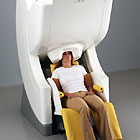| Business, neurology | |||
Elekta to supply 3-D brain mapping device to Cambridge brain science unit1 May 2006 Stockholm, Sweden. Elekta has won a tender to deliver its Elekta Neuromag, a magnetoencephalography (MEG) scanner for the non-invasive registration of nerve cell activity in the brain, to the MRC Cognition and Brain Sciences Unit (MRC CBU) in Cambridge, UK.
MRC CBU will now be able to register nerve cell activity in the brain in real time using the ability of the MEG technology to measure the intensity of very weak magnetic fields generated by electrical activity in the brain. This diagnostic tool increases the ability to understand and to improve treatment of functional disorders. MEG is presently regarded as the most efficient method for tracking brain activity in real-time for many reasons. Compared to EEG, MEG has unique sensitivity capabilities. MEG also offers functional mapping information and measurement of brain activity in real time, unlike Computer Tomography (CT) and Magnetic Resonance Imaging (MRI and fMRI) which only provide structural, anatomical and metabolic information. “The scope of the research collaboration agreement offered by Elekta Neuromag, and the associated benefits, were an important component of the added value brought to the MRC CBU by the Elekta tender.” says Professor William Marslen-Wilson, Director of the MRC CBU. He continues: “The MRC CBU has just installed one of the most advanced machines in the UK for haemodynamic measurement, in the form of its newly commissioned MRI facility. The addition of a magnetoencephalographic (MEG) scanner from Elekta, offering excellent performance in the temporal domain, will put the CBU in a highly competitive situation to meet the challenge of relating brain activity to normal and disordered cognitive function. We are very much looking forward to installing the Elekta Neuromag system in the autumn of this year.” “Non-invasive, real-time brain mapping and monitoring is considered as one of the most exciting developments in neuroscience today and around the world researchers and clinicians are developing functional neuroimaging MEG protocols. The list of new applications is steadily growing and this contract between Elekta and CBU is an important step in that progress”, says David Miles, Elekta’s Business Unit Managing Director for the UK & Ireland. Cognition and Brain Sciences Unit The Cognition and Brain Sciences Unit (CBU) constitutes one of the largest concentrations of cognitive scientists and neuroscientists on a single site anywhere in the world, with nearly 100 active scientists, students and research staff. A priority in the CBU research strategy over the last 5 years has been to develop a strong research program in neuro imaging, working closely with the Cambridge partners and now at a dedicated imaging facility on its own site. More than half of the scientific staff and students are actively involved in neuro imaging projects. From emotions and memories to language and learning, functional neuroimaging is being applied in many different areas of cognitive neuroscience. In many cases, this research relies upon support from healthy volunteers although neuroimaging studies are also being conducted in various clinical populations, including depression, anxiety, Parkinson's disease and Alzheimer's disease. Link: The Cognition and Brain Sciences Unit (CBU):
|
